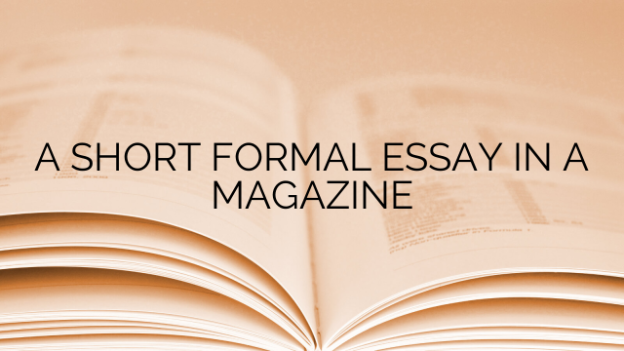Short formal essays are a staple genre found in many magazines. These essays aim to inform readers on a topic in an academic yet accessible manner. Successful short formal essays maintain a crisp tone, remain concise yet deeply informative, and leave the reader with new insights to ponder.
An important aspect of any essay is choosing an appropriate topic. The topic should be narrowly focused yet broadly interesting. It should not attempt to cover too wide a range but rather delve into one specific element of a larger issue or subject. Complex topics are best simplified and one sub-element or case study examined in-depth rather than attempting a survey. For a magazine essay, the topic also needs to have a level of contemporary relevance. Explaining the minutiae of an historical event without linking to current affairs is less engaging for busy readers.
In bringing their chosen topic to life, authors of short formal essays employ a number of techniques. Vivid descriptive passages that utilize sensory details are one method to immerse readers and maintain engagement with a dense topic. Illustrative examples, case studies, profiles of individuals, and statistical data can flesh out explanations and arguments. Quotes from experts also lend credibility while keeping the writing lively. Visual elements like charts, photographs and diagrams break up walls of text and aid comprehension of complex concepts.
As essays are by nature concise, structure and organization are crucial. A clear introduction that defines the topic’s importance and outlines the essay’s scope and argument is vital groundwork. Adhering to a steady logical flow between paragraphs enables readers to follow ideas sequentially. Transitional sentences at the start of new sections reinforce connections to previous points. Summarizing conclusions help cement takeaways and bring an air of finality.
Technical writing skills are necessary in formal essay formats. Using precise vocabulary appropriate to the level of readership and avoiding conversational or colloquial language maintains an academic edge. Terms should be defined for clarity. Careful sentence construction ensures fluidity between ideas. Active rather than passive verb constructions enhance rhythm and energy on the page when treated judiciously. Objective rather than emotional language signals credibility and serious intent to readers.
While formality of tone and depth of research are priorities, compelling writing engages emotions as well as intellect. A touch of wit or irony, where fitting, prevents dryness. Carefully placed rhetorical questions can draw readers in. Paragraphs should be of manageable length to retain focus rather than overwhelm. Text heavy with dense paragraphs risks losing readers already pressed for time in their busy lives. White space and brevity are virtues for any published writing.
Proper sourcing is essential for establishing credibility and allows readers to further explore topics of interest. In-text citations identify creditable ideas and statistics, while end citations provide paths to deeper investigation. Editorial review polishes work and provides guidance to strengthen arguments, correct errors, improve flow and ensure factual accuracy before publication. Adherence to a style guide maintains consistency in formatting citations and bibliographies.
Short formal essays in magazines expertly fulfill an informative role. By dissecting complex subjects succinctly yet accessibly, they expand general readers’ understandings and spark further thought. Adherence to principles of structure, technical writing skills, judicious use of illustrative content and proper sourcing establishes authority and trustworthiness for busy readers. The genre requires balancing rigors of research with humanity of storytelling to engage modern media consumers.
